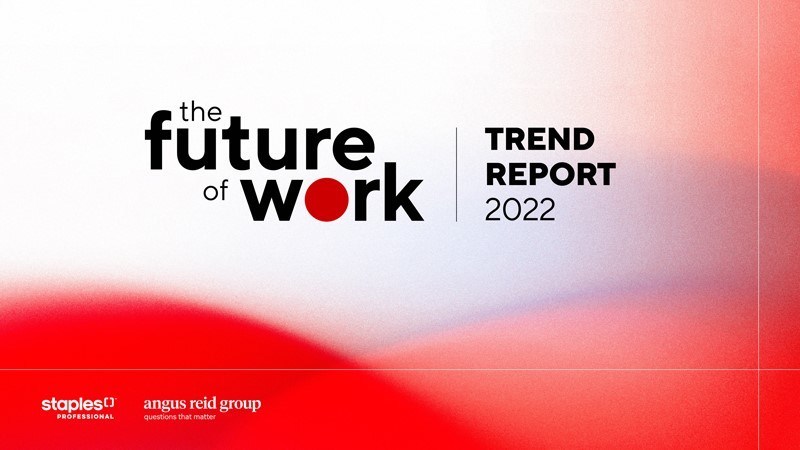
Staples Canada publishes their new study, Future of Work Trend Report
by CM Staff
Half of employees report they'd be much less likely to consider an employer if they didn't offer flex hours.

Staples Canada unveils the Future of Work Trend Report in partnership with the Angus Reid Group (CNW Group/Staples Canada ULC)
RICHMOND HILL — Staples Canada has partnered with the Angus Reid Group, to publish the Future of Work Trend Report: a summary of critical insights from Canadian employees and employers on the current and future landscape of work, equipping organizations as they navigate the new world of remote, hybrid and in-office working.
“The pandemic has accelerated a shift in Canada’s workforce and until now, few have delved into how Canadians are thinking about where, when and how they will work. Developed in collaboration with Angus Reid Group, The Future of Work Trend Report allows us to deeply examine what employees and employers across different industries are truly thinking and feeling about the future,” said David Boone, CEO, Staples Canada. “With nearly seven-in-ten respondents stating the importance of flexibility with work, it’s clear we’re at a pivotal moment and that hybrid work is here to stay. With employees counting on that flexibility and support from their employers, we’re here to equip them with the insights and the tools they need to thrive.”
Key findings from the Future of Work Trend Report include:
- Flexibility is key: It’s not just about the number of days spent in-office or at home: half of employees report they’d be much less likely to consider an employer if they didn’t offer flex hours. Furthermore, the study found that employees and employers alike were far less likely to accept a new role with no option for hybrid work.
- Productivity is a top concern returning to the office: 50% of remote/hybrid employees report concerns about being distracted and losing productivity going into the office, something which the study shows employers are underestimating.
- Home office set-ups are lacking: One quarter of remote/hybrid employees report their workspace as simply adequate or poor, with many making do without employer supports.
- Incentives are being overlooked: Special perks, flexible in-office days and having a dedicated space free of distraction are the top three drivers bringing employees into the office, with only about half of employers offering incentives to encourage the return.
“It’s clear that the current state of work has moved beyond being a function of the pandemic. Lockdowns ended up generating a variety of modes of work,” said Demetre Eliopoulos, Senior Vice President and Managing Director of Research, Angus Reid Group. “Now that we’ve moved beyond the threshold of a temporary setup, companies and employees alike need to decide what an optimal and productive configuration will look like.”